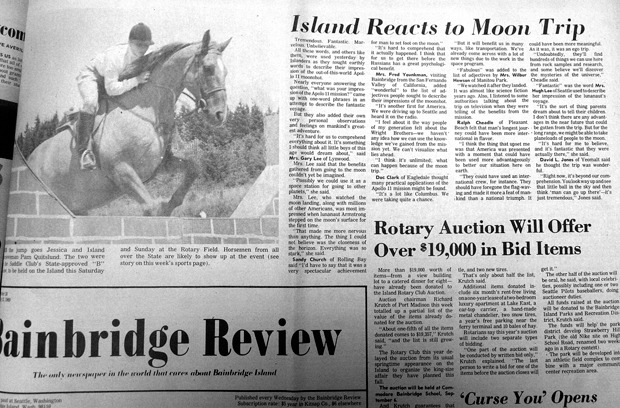Neil Armstrong has become a household name ever since his historic first step on the surface of the moon. The famed astronaut set off on his final journey from this world on Aug. 25; Armstrong’s family said he died following complications resulting from cardiovascular procedures. He was 82.
Steve Ruhl, president of the Battle Point Astronomical Association, remembered watching Armstrong’s first lunar steps on a television at his high school.
He excitedly took a picture of the television screen.
“It was clear it was historically significant,” Ruhl said. “I thought it was a logical conclusion; it was the right step in the right direction, just like (Armstrong) said, ‘One small step for man, one giant leap for mankind.’”
Ruhl has always admired Armstrong’s character in the years following his famous mission to the moon. Not only was he a gifted astronaut, he was a humble man.
“He was a skilled pilot and then also an intensely private person,” Ruhl said.
“How many people would you know who could have their meal ticket punched anywhere and never took advantage of it?”
“He took this publicity with an extremely quiet elegance,” Ruhl added.
Bainbridge Island also looked to the sky, and to television screens, on July 20, 1969 to watch Armstrong and fellow lunanaut Buzz Aldrin walk on the moon’s surface. It was a milestone in human achievement.
On Wednesday, July 23, 1969, The Bainbridge Island Review reported islanders’ reaction to the moment. The story ran on the front page, above the fold and the newspaper’s nameplate.
Mrs. Gary Lee of Lynwood recalled anxiously watching Armstrong take his first step.
“That made me more nervous than anything,” she said. “The thing I could not believe was the closeness of the horizon. Everything was so stark.”
One word that nearly every islander said was “comprehension.” The feat was just so out of this world.
“Right now, it’s beyond our comprehension,” said David Jones of Yeomalt. “You look way up and see that little ball in the sky and then think ‘man can go up there’ — it’s just tremendous.”
Sandy Church of Rolling Bay was equally astounded.
“It’s hard to comprehend that it actually happened,” he said.
“I’d have to say that it was a very spectacular achievement for man to set foot on the moon,” Church also noted.
Beyond the sheer shock of the successful journey, islanders were perhaps a bit ahead of their time in thinking of the possibilities space travel could hold for humans.
“It’s hard for us to comprehend everything about it. It’s something I should think all little boys of this age would dream about,” Mrs. Lee said.
Not only would little boys dream about going to space, but also little girls. But Lee wasn’t finished speculating.
“Possibly we could use it as a space station for going to other planets,” she said.
Almost 40 years later, President George W. Bush would state national aims to shoot for the moon. President Barack Obama has broadened upon that vision and included ventures to Mars and other Earth neighbors such as asteroids. The successful landing of the Curiosity rover earlier this month on the red planet may indicate humans are steadily on such a path.
Ralph Cheadle of Pleasant Beach was in awe of the lunar landing in 1969, but said that he would have liked the trip to have had a more international feel that showed it as a human achievement, not just a single nation’s.
In the decades since the landing, international cooperation has become increasingly popular for space missions. Members from France, Syria, Russia, India and more have been floating along side Americans in orbit around the planet. The international space station continues to host scientists from a variety of nations.
Some things haven’t changed, however, since 1969. Today, many Earthlings remain looking to the skies wondering about what space travel could lead to.
Doc Clark was one such islander in 1969 who appreciated what space travel could mean to the planet.
“It’s a lot like Columbus. We were taking quite a chance,” Clark said. “But it will benefit us in many ways, like transportation. We’ve already come across with a lot of new things due to the work in the space program.”
Clark was right. As Ruhl looks back on the lunar missions from today’s perspective, he can point to its benefit and influence on our society.
“One of the greatest effects was all the technology related to it that was expanded,” Ruhl said. “Everything from velcro and all the micro-electronics.”
“That investment in the space program drove the economy of the United States like it had never been before,” Ruhl added.



